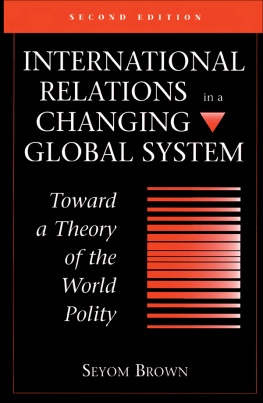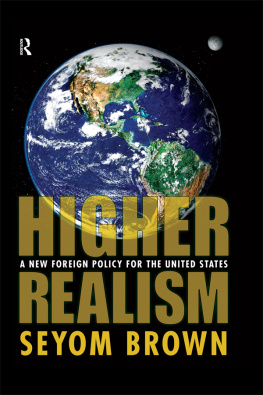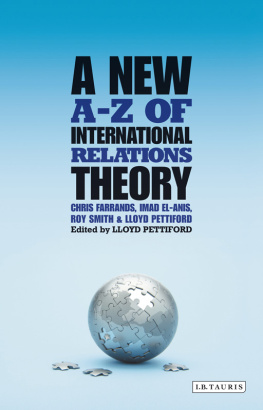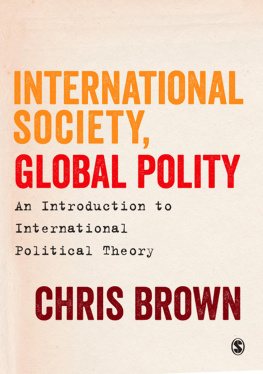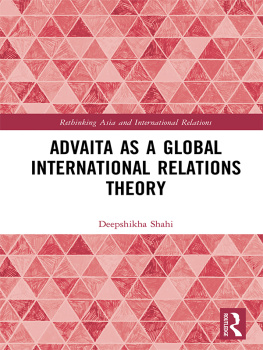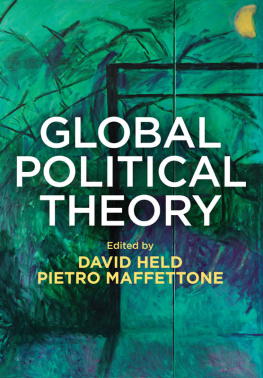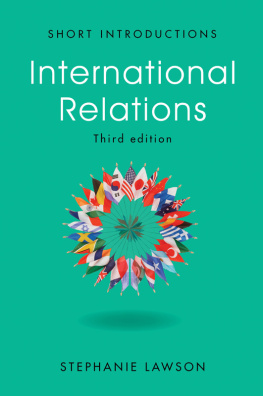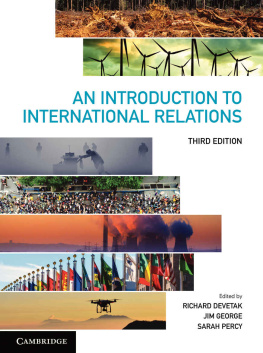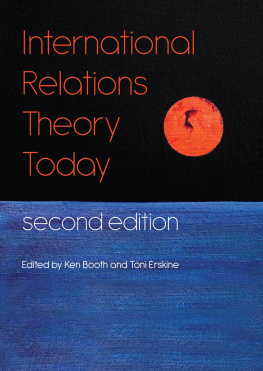First published 1996 by Westview Press
Published 2018 by Routledge
711 Third Avenue, New York, NY 10017, USA
2 Park Square, Milton Park, Abingdon, Oxon OX14 4RN
Routledge is an imprint of the Taylor & Francis Group, an informa business
Copyright 1992, 1996 Taylor & Francis
All rights reserved. No part of this book may be reprinted or reproduced or utilised in any form or by any electronic, mechanical, or other means, now known or hereafter invented, including photocopying and recording, or in any information storage or retrieval system, without permission in writing from the publishers.
Notice:
Product or corporate names may be trademarks or registered trademarks, and are used only for identification and explanation without intent to infringe.
Library of Congress Cataloging-in-Publication Data
Brown, Seyom.
International relations in a changing global system : toward a theory of the world polity / Seyom Brown. 2nd ed.
p. cm.
Includes bibliographical references and index.
ISBN 0-8133-2352-5 (hardcover). ISBN 0-8133-2353-3 (pbk.)
1. International relations. 2. International organization.
I. Title.
JX1391.B73 1996
327.1'01dc20
95-23651
CIP
ISBN 13: 978-0-8133-2353-4 (pbk)
The need for new thinking about international relations, which compelled me to write the first edition of this book, has not abated. If anything, it has become more pressing, as a succession of postcold war crises has increasingly exposed the inadequacies of the institutions and norms of the nation-state system.
This predicament has been reflected in a series of global summit conferencesattended by the heads of state or cabinet-level officials of virtually every country: the United Nations Conference on Environment and Development (Rio de Janeiro, 1992); the World Conference on Human Rights (Vienna, 1993); the International Conference on Population and Development (Cairo, 1994); the World Summit for Social Development (Copenhagen, 1995); and the World Conference on Women (Beijing, 1995).
The eruption of international summitry is a symptom of the spreading realization by the peoples of this planet that, like it or not, and despite their differences, they are increasingly interdependent. More and more, what happens in one part of the world affects the well-being of people in every continent. The mobility of things, information, and persons and the capabilities of humans (by design or inadvertence) to alter the natural world mean that people who had previously been remote from one another are not only coming into contact but are getting in each others waymaterially and psychologically.
Looked at systemically, the problem is one of growing incongruence, or structural mismiatch, between the emergent world society and the traditional world politya polity whose national sovereignty norms and structures are the legacy of a very different social reality. Indeed, without considerable restructuring of the inherited nation-state system, few of the principles and programs endorsed by governments at the global summits can be effectively implemented. Yet such undertakings are being embraced (at least rhetorically) in the absence of the kind of political theory required to assess the feasibility and desirability of the more fundamental structural reforms that are implied.
In other words, much of todays international statecraft is being conducted in a philosophical vacuum. Even the innovative 1995 report of the Commission on Global Governance, despite its attention to Values for the Global Neighborhood, is largely devoid of the basic theoretical reasoning that its institutional recommendations presuppose.
It would be presumptuous of me to aspire to fill this vacuum. Rather, my more modest purpose is to develop the case for a theory of the world politya theory responsive to the need of the inhabitants of the planet Earth to learn to live with one another without destroying themselves and the planet in the process.
Unfortunately, the theory I am calling for has neither a rich corpus of recent and contemporary political philosophy nor an appropriate body of twentieth-century thought about international politics to draw on. The political philosophers have concentrated primarily on the requirements of order and justice within countries. And the body of thought that focuses on relations among countriesinternational relationshas rarely delved beyond the paradigm of sovereign nation-states selfishly pursuing their interests in an anarchic world polity.
Given the extent to which these two realms of theoretical discourse have developed in isolation from one another in recent decades, it is no wonder that a 1979 book written with the explicit purpose of bridging the gulf, Political Theory and International Relations by Charles Beitz, was generally regarded as an anomaly by established academics in both fields. Another effort to connect the province of political philosophy to the field of international relations, Terry Nardins 1983 book, Law, Morality, and the Relations of States, suffered a similar fate. One of the few philosophically erudite international relations specialists, Stanley Hoffmann, also tried in his Duties Beyond Borders, published in 1981, to sensitize his colleagues to the need and opportunities for ethical statecraft in a world of increasing interdependencies; but Hoffmanns fellow political scientists gave only passing attention to his prescient arguments.
In the 1990s, howeverstimulated by the post-cold war controversies over human rights and global povertyinternational relations scholars have been rediscovering the importance of normative issues, while political philosophy scholars have been retrieving and reexamining the works of those thinkers whose wisdom extended to the relations among states. Symptoms of the trend are Chris Browns International Relations Theory: New Normative Approaches and the volume of essays edited by Terry Nardin and David Mapel under the title Traditions of International Ethics.
Notably, this expanding dialogue has engendered fresh contributions by moral philosophers such as John Rawls and Michael Walzer. Prodded by colleagues to trace out the international implications of his seminal A Theory of Justice, Rawls has outlined what he calls The Law of Peoples (essentially a reiteration of the ethics of nonintervention) in his 1993 Amnesty International Lecture at Oxford. And Walzer, in his Thick and Thin: Moral Argument at Home and Abroad, published in 1994, elaborates on the ideaonly touched on in his earlier worksof a minimalist international moral code, in addition to the laws of war, to which countries must be held accountable.
The new literature on the normative dimensions of international relations has helped me prepare the second edition of this book. But most of the new work by othersstill operating on the assumption that the nation-state system is (and ought to be) the essence of the world polityfails to move the discourse very far toward the basic explanatory or normative theory that I called for in the first edition.


